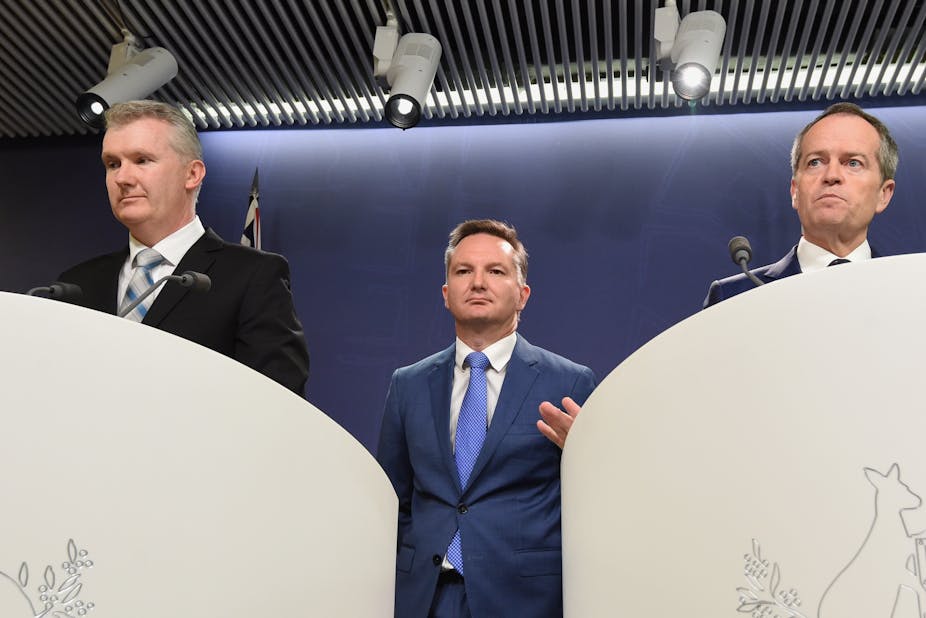Labor’s weakest flank in this election is economic credibility and it knows it.
A combination of the past, including memories of Wayne Swan’s ever-elusive surplus, and the present, with the perception that Labor is throwing a lot of money around, is putting Bill Shorten under intense pressure as he looks towards the final three weeks of the campaign.
Malcolm Turnbull mightn’t have established that his ten-year company tax cut will be an economic elixir. But Shorten definitely has not satisfactorily set up a strong link between his spending program and economic growth.
Shorten’s problem existed before Labor’s admission this week that over the forward estimates it would run larger deficits than a Coalition government would. But that concession worsened it substantially.
The opposition’s pledge that it would still match the Coalition projection of having the budget back in balance by 2020-21 doesn’t get over the difficulty. Indeed, it compounds it by inviting the question: does this sound probable, given there are already doubts over the government’s aspiration for a budget balance by then?
Aware that it had sunk into a hole, Labor on Friday produced some fresh savings, amounting to A$16 billion over a decade, but only $2.6 billion over the forward estimates. These included updated figures from earlier announced policies, a number of new saves and a backdown on its opposition to several of the so-called “zombie” measures that the government hasn’t been able to get through parliament.
The move had a whiff of desperation about it. Whether the production of new savings can neutralise the damage done this week by the deficit admission we’ll have to wait to see. But one doubts it. From the voter’s point of view, the fine print of numbers has already become impossible to follow. People are being left with impressions.
The government certainly operates on that assumption. Treasurer Scott Morrison’s initial claims about the size of Labor’s “black hole” were shameless and outrageous. But he didn’t care because he works on the basis that people won’t be listening too closely.
Given the difficulty posed for it by the economic debate, one would have thought Labor would have contained its spending to ensure it did not go over the government’s deficit numbers, outlined in the budget, in the forward estimate years.
Instead, it thought people would be impressed that it was being honest, and by its argument that in the later years of the decade ahead it would have better budget numbers than the government.
Not that any of these figures, from either side, will mean a toss as the election recedes into memory.
Even talking about numbers over the four year budget period has an air of unreality. The decade-long estimates of commitments and costings that Labor is favouring – and the government too, in its tax program – are an absurdity.
If anyone doubts that, just think back a decade to 2006 when the sunlight of the mining boom was warming the budget. If policymakers had known then all that they do now, different decisions might have been taken.
And we’ve already been given notice that things could change very quickly post-election. Labor promises a mini-budget if it gets in. Does anyone think there wouldn’t be adjustments to its program in that?
On the other side, Morrison is desperate to get more spending cuts in a second term.
But in these last pre-election weeks, a certain fairyland precision is the name of the game (unless you are Morrison bagging Labor) when discussing numbers.
As it scrambles to convince the public it will have enough funds to pay for its program, and that it is a believer in budget repair, Labor has had to revisit some of the government’s measures it previously obstructed.
In Friday’s announcement, it has done several backflips, although it still refuses to give way on many items and concedes the net impact of unlegislated measures would be a cost of $5.5 billion over the forward estimates and $23 billion over the medium term. The government would put the numbers much higher.
Some of the retreats may cause a degree of angst, such as agreeing to reducing the threshold for the repayment of student debt.
Labor would not hack into the Family Tax Benefit system anything like as savagely as the Coalition, but it has had to come up with modest moves. Its proposed reduction of Family Tax Benefit A’s end-of-year supplements by 50% for families with incomes of over $100,000 would hit some 137,000 families, who would lose $366 a year per child.
One total mystery is why Labor didn’t deal with these retreats weeks or months ago. Did it think they wouldn’t have to be made?
At this late stage Labor has been left with making or accepting some politically awkward savings that carry a relatively limited financial return over the budget period. For Shorten, the ultimate nightmare would be if they set off grass fires while failing to help convince people that Labor’s program of largesse is absolutely responsible.

